Making the most of social networks as a writer
I love social media. Some of this is probably due to the fact that it was my day job prior to writing. In my past life as a web designer, my days consisted of designing gorgeous and useable websites for our clients, as well as coming up with content and marketing plans. Many of these proposals included social media strategies.
I found my past marketing experience immensely helpful when I needed to begin promoting my own books. Now more than ever, writers are expected not only to write the novels, but to promote them as well. We're told to maintain a blog, sign up for twitter, cross-post to tumblr and facebook and on and on.
It can certainly be overwhelming. For those who aren't a huge fan of social media, I wish I could say it was all pointless and you don't need to worry about it as a writer. But I honestly don't believe that's true. The internet is an amazingly powerful tool, and so. many. readers. are online these days. Unless you're a huge superstar like J.K. Rowling, it would be foolish to completely ignore the marketing opportunities at your disposal.
That said, you do not have to do everything.
I think this is the biggest mistake I see writers making. Some have little to no online presence prior to a book deal (save for maybe a blog), and then after signing a contract, they register for ALL THE NETWORKS. Then they try to keep them all active.
Here's my number one tip: When it comes to managing social media, only do the things you love.
These outlets should be fun, not chores. So if you hate blogging, stop forcing yourself to maintain a ridiculously unrealistic schedule. If you feel lost every time you sign onto twitter, don't obsess about tweeting a dozen times a day. If you pour your time into every network evenly, you'll be stretched too thin. You won't have quality writing time, let alone a life, and you'll be grouchy on top of it. So figure out which social networks are your favorites, and make them your primary soap boxes when it comes to connecting with fans. (For me personally, it's twitter and tumblr. I absolutely adore these outlets, so they are where I spend the most time.)
My second tip: Be yourself.
If you're putting on your Professional Author Shoes whenever you sit down to tweet or blog or tumble, you'll face burnout in no time. LinkedIn is where you need to be professional and serious. Most other networks are about making connections and sharing what you love. The more natural you can be in these settings, the less like work they will feel.
At the same time, it's important to remember that each network has it's own niche and can be leveraged by writers in different ways. While I spend most of my time on twitter and tumblr, I do have accounts with most major networks, and tend to jump between them as my needs see fit.
Some thoughts on how you can make each social network work for you:
[hr]
Twitter
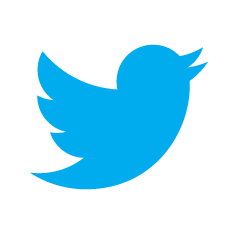
This is a great platform for making connections within your industry, but remember that twitter is a party, not a podium. Talk too much solely about your own writing/book and people will start tuning you out, so be sure to engage in two-way conversation. My favorite tweeps are users who respond to me and share compelling content/links. Knowing this, I try to do the same in return.
Best for: connecting with publishing professionals (writers, agents, editors, book reviewers, etc)
Authorly tips:
Leverage the RT functionality for giveaways. Example: I sometimes tweet a picture of the prize and track RT's as official entries.
Use unique hashtags to host events/games/Q&As, or pair it with a giveaway for added branding. Example: I host #namethatbook several times a year--a fun game for bookish people.
Share what you find exciting. (This can be your news, or the news of others, or a fun link about dolphins. Just remember that people will follow you because of what you bring to the table. If you also happen to have a book coming out, that might be an added bonus.)
[hr]
Facebook

Facebook is still the reigning king of social networks, drawing the highest number of users. Setting up an author page and taping into this audience can't hurt. This is the only major network I don't use for my writing outreach (I'm not a huge fan of facebook, so based on my #1 rule, I avoid using it) but I've often wondered if I'm missing out on connecting with a huge chunk of readers. Case in point: If a person isn't big on social networks and has only one account to stay up-to-date with all his/her friends, chances are it's a facebook account.
Best for: broadcasting events and news
Authorly tips:
Invite friends to "like" your author page once you set it up. (This isn't just for the vanity purpose of having likes. You want users aware that the page exists, and "liking" it will ensure they see updates when you post news in the future.
Utilize facebook events to share and promote your appearances and/or book signings.
Many outside networks let you automate cross-posting to facebook, meaning content you post on one site (such as tumblr) will also push to your facebook author page wall. Look into setting this up as you see fit.
[box type="info"]EDIT: Since writing this post, facebook changed it's algorithms and only a small percentage of your likers will actually see your posts. I now suggest skipping an author page and just sharing events via a personal page if you have one. If not, maybe skip facebook for author needs altogether.[/box]
[hr]
Tumblr
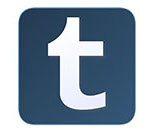
This is where the teens are*, but this doesn't mean it's the place to hard sell your book non-stop. With an energetic and laid back culture, tumblr is about sharing what you love. Since the micro-blogging platform relies heavily on image-based posts, I've found this network most useful when I use it as a visual diary. I post things about my book from time to time, but for the most part I share and reblog things I find inspiring and awesome--art, photography, fandom things, and so on. Think of tumblr as a place to show who you are, not what your book is. You'll naturally gather followers who fangirl/boy over the same things you do.
Best for: fandom goodness and geekery
Authorly tips:
Text-based posts are okay in moderation, but for lengthy and frequent ones, move over to your blog.
Be sure to set up your "ask box" so users can submit questions and easily reach out to you.
Teaser quotes prior to launch are a great way to promote your book within the tumblr framework. (Example: image teasers for my upcoming releases)
Always credit posts that are not yours.
[hr]
Instagram
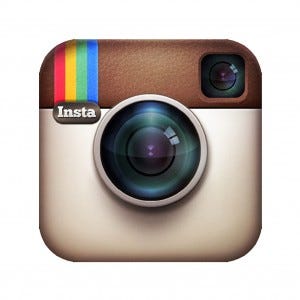
I like to think of instagram as the mobile, lite version of flickr. This network is all about in-the-moment image sharing. (They added video recently too!) I don't do too much authorly posting on this site--most of my uploads are nature and landscape shots--but my most popular posts in 2013 were the ones where I shared bookish photos. So rest assured that readers are on this platform, and they will find you! (Especially if you cross post photos to Twitter/Tumblr/etc.)
Best for: photo sharing, especially behind-the-scenes peeks at your writing
Authorly tips:
Post first glances at swag or ARCs to stir up reader interest.
Be sure to update your profile photo and bio so you are easy to find (Suggestion: pick a photo that matches your twitter avatar, and name your books in your bio line)
Give readers a behind-the-scenes look at your process. Post pictures of your writing space, brainstorm notebooks, post-it note outlining, and so on!
[hr]
Pinterest
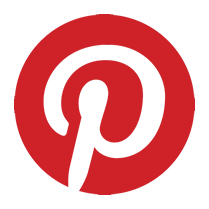
The demographic for this network skews older and female, but promotional opportunities aside, Pinterest is a fabulous resource for writers. It's essentially an image bookmarking site, letting users "pin" images to various "corkboards". I have boards designated to specific story ideas, and others to general needs—potential characters, fantastical settings, useful diagrams, and so on. While Pinterest is a great organizational tool, it also allows readers a peek at how you envision certain characters and locations.
Best for: image bookmarking and visual brainstorming
Authorly tips:
Designate a board for each of your books so readers can explore your visualization of the story.
Consider making a board for fanart. It's a nice way to show appreciation for the art readers create for your books while simultaneously establishing a single location for other readers to browse it.
"Secret" boards can be used to brainstorm new ideas privately. Turn these public when you're ready to share your image collection with others.
When possible, tie pinterest to your giveaways. Example: I hosted a pre-order contest when Taken first launched. Extra entries were earned by sharing a picture of a reader holding their copy of the book, and I collected these on a #TakenWithTAKEN board.
[hr]
YouTube
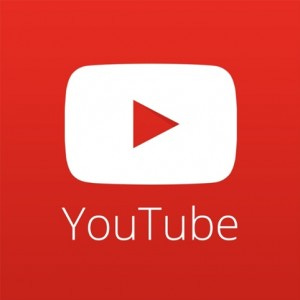
Naturally, vlogging is the driving force behind YouTube. If blogging is tedious for you and you'd rather talk to your audience, this might be the perfect outlet. I have a youtube channel, but I've only used it to post Scrivener tutorials. That said, this is the beauty of youtube. It's your channel, about anything you want to discuss with your audience.
Best for: vlogging and live-stream events
Authorly tips:
Try to brand your channel page. Simple and sweet does the trick. (Examples: Kiera Cass, Jackson Pearce)
Host a live stream event and answer viewer questions in real time! (Tutorial here)
I honestly don't have many insights to this network because I use it so infrequently. If you have suggestions and tips, please leave them in the comments!
Goodreads
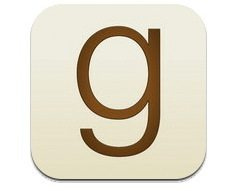
Goodreads is for readers, but writers are readers too. I don't rate books with stars (more on that here), but I do like to share my thoughts via text-based reviews. I truly enjoy talking about the books I've read and discussing them with others. (Again, it all comes down to doing what you enjoy!) Perhaps even more importantly, goodreads has a few great features available to authors (known as the Goodreads Author Program) to help them connect with their fanbase.
Best for: book discussions and promotional opportunities
Authorly tips:
Connect your goodreads author account to your blog. This will ensure your blog posts appear in your followers's goodreads feed.
Host a giveaway for an ARC or finished copy. These are free to create and open to whatever territories you decide. (How-to guide)
Be as involved (or uninvolved) in the goodreads network as you feel comfortable. Once your book is out in the world, it can become difficult to navigate any site where reviews and reader comments are in the open. If you're in the camp that needs to avoid goodreads, that's perfectly fine, but I do suggest at least having your author profile claimed and up-to-date so readers can find your website, twitter handle, and so on.
[hr]
A Personal Website/Blog
Your personal website should almost act like a resume. Your books, bio, contact information, events, and links to your presence on other networks should all be available on this site. If you do absolutely nothing else in the way of web presence, a personal website is the one thing I consider a must. It doesn't have to contain a blog unless you feel up to it. But if someone googles your name, they should be able to come to your website and learn who you are, what books you've written, and how to contact you.
Best for: a home base for all information
Authorly tips:
Consider creating a page per book, where you can share the premise, highlight reviews, and provide readers buy links. Example: I've done this with Taken and the other books in the series.
Your blog is your way of communicating with readers. There are no right and wrong rules. Blog as you see fit, and as often as you're comfortable.
Extra content is a great way to entice readers to the site. If you have some, be sure to gather it in one central location.
Compile a press kit and make it downloadable via your site. Any time someone ask for your headshot or a cover photo, direct them to the link.
Set up a mailing list and invite people to subscribe. As much as you hope readers will visit your site often or read your blog via rss, some won't. A mailing list is a great way to ensure these people don't miss out on news. Suggestion: Mail Chimp is a fantastic email marketing service, and it's free for up to 2,000 subscribers.
[hr]
I realize this is a lot to take in, but hopefully it was helpful and got you thinking about how you can utilize different networks to effectively connect with your audience. I want to reiterate: you do not have to do everything, and you should only do what you enjoy.
Now, I'm curious... What are your favorite social networks, and how do you utilize them to engage with readers and writers? Please leave your thoughts in the comments, and if you have additional tips to add to my lists, please share those too!

